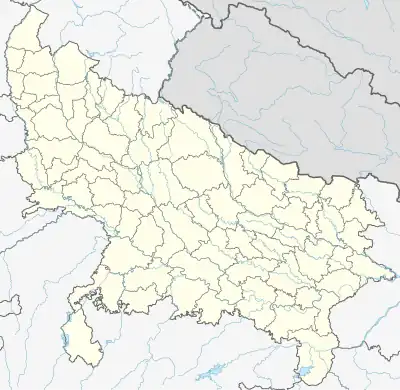Mughalsarai | |
|---|---|
Town | |
 Mughalsarai Location in Uttar Pradesh, India | |
| Coordinates: 25°18′N 83°07′E / 25.3°N 83.12°E | |
| Country | |
| State | Uttar Pradesh |
| District | Chandauli |
| Government | |
| • Body | Municipal Council |
| • Chairman | Sonu Kinnar (independent)[1] |
| • MLA | Ramesh Jaiswal (BJP)[2] |
| Elevation | 65 m (213 ft) |
| Population (2011)[3] | |
| • Total | 109,650 |
| Language | |
| • Official | Hindi[4] |
| • Additional official | Urdu[4] |
| • Regional | Bhojpuri |
| Time zone | UTC+05:30 (IST) |
| PIN | 232101 |
| Telephonic Code | 05412 |
| Vehicle registration | UP 67 XX XXXX |
Mughalsarai (/ˌmuːɡhælˈsɑːreɪɪ/; English: Mughal Tavern[5]), officially known as Pandit Deen Dayal Upadhyaya Nagar,[6] is a town and a municipal board in the Chandauli district of Uttar Pradesh. Located around 16 kilometres (10 mi) from Varanasi, it is an important railway junction.[7]
History
Mughalsarai is located along the Grand Trunk Road (NH 19), also called Sadak-e-Azam by Sher Shah Suri, was one of the corridors connecting North India with the east during the Mughal period. In past centuries, it has been variously known as Mughalchak, Mangalpur and Oven Nagar. The township was named Mughalsarai when Indian railways established a junction here in 1883.[8]
In August 2018, the city was renamed as Pandit Deen Dayal Upadhyaya Nagar, after Deendayal Upadhyaya, a politician and leader of the Bharatiya Jana Sangh.[9]
Geography
Mughalsarai is bisected by NH 19 into three parts. The southern part mainly consists of railway colonies like Vasant Vihar, New Central Colony, Diesel Colony, Haper Colony, European colony, Shubhash Nagar, Loco Colony, and Roza Colony, Plant-Depot Colony and Saresar, Alampur. It starts after the Parao Road in Varanasi and continues until Alinagar Road which comes after Railway Colony on the south. A few mohallas are near the railway station like Qassab Mohal, and Gram Panchayats like Amoghpur, Taranpur, Pashurampur, Dharamshala, Mainatali and Galla Mandi. However, situated on the west side are the Kailashpuri and Ravinagar colonies which compose the poshest area in the city.
Demographics
As of 2011 Indian Census, Mughalsarai had a total population of 109,650, of which 57,682 were males and 51,968 were females. Population within the age group of 0 to 6 years was 14,864. The total number of literates in Mughalsarai was 76,936, which constituted 70.2% of the population with male literacy of 76.0% and female literacy of 63.7%. The effective literacy rate of 7+ population of Mughalsarai was 81.2%, of which male literacy rate was 87.9% and female literacy rate was 73.7%. The Scheduled Castes and Scheduled Tribes population was 17,943 and 2,093 respectively. Mughalsarai had 16,796 households in 2011.[3]
Politics
Mughalsarai (Assembly constituency) represents the area.
Transportation
The Pandit Deen Dayal Upadhyaya Junction railway station is the fourth busiest station in India, with about 125 passenger trains passing through it.
Notable people
- Lal Bahadur Shastri, the second Prime Minister of India was born here.
- Ramesh Jaiswal, member of 18th Uttar Pradesh Assembly
References
- ↑ कांत, उत्पल (16 May 2023). "Sonu Kinnar: नवनिर्वाचित चेयरमैन सोनू किन्नर के संघर्ष की कहानी, 10 वर्ष की उम्र में हुआ था खौफनाक सच का सामना". Amar Ujala (in Hindi). Retrieved 29 May 2023.
- ↑ "Mughalsarai Assembly Seat Result LIVE: मुगलसराय सीट पर भाजपा का परचम लहराया, रमेश जायसवाल जीते". News18 हिंदी (in Hindi). 11 March 2022. Retrieved 29 May 2023.
- 1 2 "Census of India: Mughalsarai". www.censusindia.gov.in. Retrieved 20 December 2019.
- 1 2 "52nd REPORT OF THE COMMISSIONER FOR LINGUISTIC MINORITIES IN INDIA" (PDF). nclm.nic.in. Ministry of Minority Affairs. Archived from the original (PDF) on 25 May 2017. Retrieved 20 December 2019.
- ↑ "Roads and Sarais of Sher Shah Suri". www.barmazid.com. Retrieved 31 December 2018.
- ↑ Dikshit, Rajeev (14 September 2017). "Mughalsarai town becomes Pt Deen Dayal Upadhyaya Nagar". The Times of India. Retrieved 4 July 2023.
- ↑ The National Geographical Journal of India, Volume 10. National Geographical Society of India. 1964. p. 136.
Its importance as a railway junction can well be understood by the fact that more than 50 passenger trains and over 150 goods trains pass through it within 24 hours. The amount of coal passing through Mughalsarai was about 39,000 tons daily in 1960 and the wagons carrying coal from this end to other stations numbered 1,729 per day.
- ↑ Dikshit, Rajeev (5 August 2017). "The many names of Mughalsarai". The Times of India. Retrieved 4 July 2023.
- ↑ Raghuvanshi, Umesh (27 October 2018). "After Allahabad became Prayagraj, clamour grows for name changes in UP". Hindustan Times. Retrieved 4 July 2023.